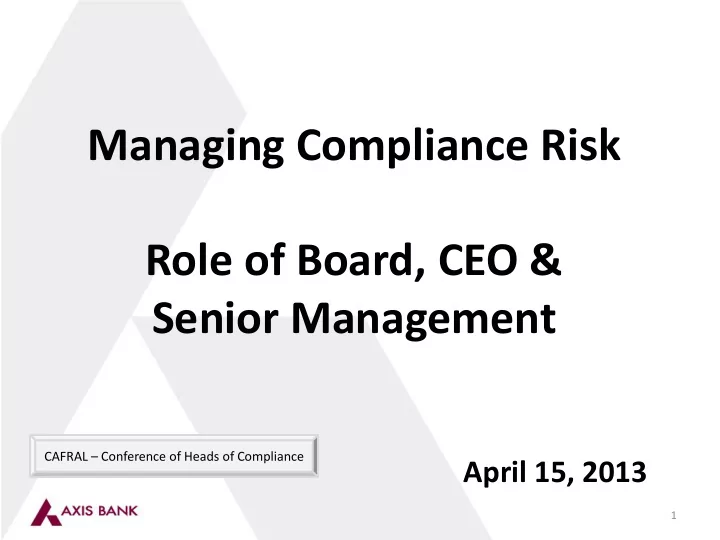

Managing Compliance Risk Role of Board, CEO & Senior Management CAFRAL – Conference of Heads of Compliance April 15, 2013 1
Compliance Risk • Basel Committee defines Compliance Risk as the risk of legal or regulatory sanctions, material financial loss, or loss to reputation a bank may suffer as a result of its failure to comply with laws, regulations, rules, related self-regulatory organization standards, and codes of conduct applicable to its banking activities. How does it Manifest Regulatory Action Media Coverage Increase in Impact on image Loss of Fines operating revenue costs Capital requirement under Basel 2
Some Recent Example s Libo Libor r Fixing Fixing Ter errorist orist Fin Finan ancin cing g Deri Deriva vati tives es Mon Money ey La Laun unde dering ring False alse D Disc isclosu losures es Cobr Cobra P a Post ost 3
Reputational Damage Sub Sub – Prime Prime Cr Crisis isis Ex Exec ecut utiv ive e Comp Compen ensa sation tion – Golde Golden n Han Hands dsha hake Par articipa ticipating ting in T in Tax ax Eva Evasion sion Misha Mishand ndli ling ng of of Cust Custome omer r Comp Complaints laints 4
What is Compliance All About… Adhering to rules of the land Universe includes Statutes such as RBI Act, FEMA , BR Act, PMLA, Labour Act, Land usage laws, IT Act , Companies Act, NI Act , Industrial Disputes ( Banking and Insurance) Act etc. State level regulations such as Stamp Act, Shop & Establishment Act etc. Regulations issued by RBI , SEBI, IRDA, PFRDA, FMC etc. and Overseas Regulators Standards and Codes prescribed by IBA, BCSBI, FEDAI, FIMMDA, AMFI Stock Exchange guidelines Codes of practice promoted by industry associations 5
Culture of Compliance • It goes beyond having good policies and procedures, dedicated compliance function etc. • When every employee of the organization is concerned about compliance, the culture can be said to have set in • Compliance culture is vital to create an organization that is “built to last” 6
Where to start-some principles / thoughts • Integrating Compliance into the fundamental business activities so that it becomes an integral part of doing business and not an interruption to business • Key actions Revisiting and refining processes for embedding compliance into operations Defining roles and responsibilities of all concerned Building common control framework • Using the examination procedures of the regulators as a guide for self assessment • Aim is to make compliance the most effective corporate culture that emphasizes standards of honesty and integrity • Leveraging analytics 7
Organisation Actions Drawing list of applicable laws and preparation of checklist Use of Dashboards to monitor exceptions Inculcating Compliance Culture through : Incentives Training Communication 8
Role of Board of Directors • Exercising oversight on issues of business integrity and compliance by examining: – Who are the senior level officials critical for identification and resolution of compliance issues – What are the key issues that need to be addressed – When the Board should be informed and when they should proactively intervene – How the issues are addressed from a systemic perspective consistent within their fiduciary responsibilities 9
Role of CEO & Senior Management • Reinforcing the tone set by the Board • Assisting the Board to make informed judgment on whether the Bank is managing compliance risk effectively • Integrating compliance function in the decision making, before the event not ex-post 10
Role of Business Heads • Ensuring Compliance as first line of defence • Setting ethical standards for conduct of business • Alignment of processes with the fundamental tenets of Compliance 11
Role of CCO • Upholds and propagates the culture of Compliance • To apprise Senior Management and Board of Compliance issues proactively and not only when a problem occurs • As the focal point of contact with the regulator, through frequent dialogue, Senior Management should be sensitized about regulatory expectations 12
Thank You 13
Recommend
More recommend